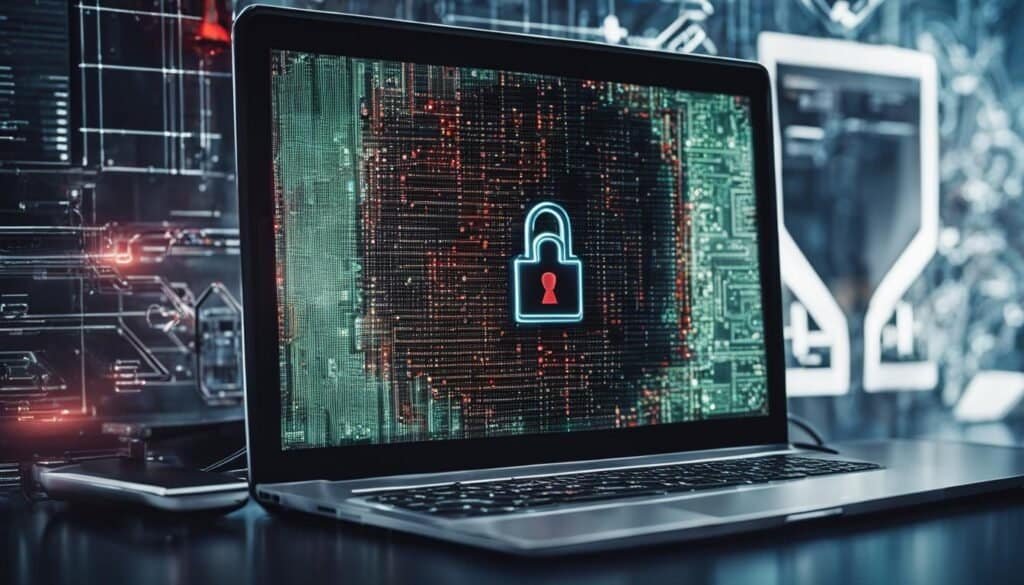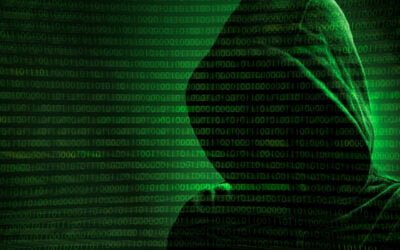With the rapid advancement of technology and our increasing reliance on the internet, our online security is more important than ever. Cybersecurity threats and privacy invasion are prevalent issues that we must address to protect ourselves in the digital age.
As an individual, it’s essential to understand the risks and take proactive measures to secure your online privacy. By implementing effective strategies and utilizing the right tools, you can minimize the chances of hackers watching your every move online.
Key Takeaways:
- Stay informed about the latest cybersecurity threats and take steps to protect your personal information.
- Use a VPN to encrypt your internet traffic and mask your IP address for enhanced online privacy.
- Ensure websites you visit have SSL/TLS certificates for secure communication.
- Manage your social media privacy settings to control who can access your posts and personal information.
- Consider using anti-hacker software to block malicious activities and protect against cyber threats.
The Information Available to Hackers
When it comes to online privacy, it’s important to understand the kind of information that hackers can access. From personally identifiable information (PII) to browsing data and email communications, hackers have the potential to infiltrate various aspects of our online lives.
Personally identifiable information, commonly referred to as PII, includes sensitive data such as names, addresses, email addresses, and social security numbers. This information is especially valuable to hackers as it can be used for identity theft and other malicious activities. With this information, hackers can impersonate individuals, access their online accounts, and even carry out financial fraud.
In addition to PII, hackers can also gain access to browsing data and email communications. Browsing data provides insight into an individual’s online activities, including the websites they visit and the searches they make. This information can be used to create targeted phishing attacks or to build a profile of an individual’s interests and preferences. Similarly, email communications contain a wealth of personal and sensitive information, which can be exploited by hackers for their nefarious purposes.
| Type of Information | Examples |
|---|---|
| Personally Identifiable Information (PII) | Names, addresses, email addresses, social security numbers |
| Browsing Data | Websites visited, search history |
| Email Communications | Personal conversations, sensitive information |
| Online Accounts | Username/password combinations, login credentials |
It is crucial to be aware of the information that hackers can access and take steps to protect our online privacy. By implementing effective security measures and being mindful of the information we share online, we can minimize the risk of falling victim to cyberattacks.
Protecting Your Online Privacy with a VPN

When it comes to securing your online privacy, using a Virtual Private Network (VPN) is an effective solution. A VPN provides a secure and private connection by encrypting your internet traffic and masking your IP address. This makes it difficult for hackers to track your online activities and gain access to your personal information.
One of the key benefits of using a VPN is its ability to protect your privacy when connecting to public Wi-Fi networks. Public Wi-Fi networks are notorious for their vulnerability to hacking attempts, as they often lack proper security measures. By using a VPN, you can ensure that your internet traffic is encrypted and your IP address is concealed, preventing hackers from intercepting your data.
In addition to securing your online privacy, a VPN also allows you to bypass geographical restrictions and access content that may be blocked in your location. Whether you want to stream your favorite shows or access websites that are restricted in your country, a VPN enables you to do so anonymously and securely.
| Benefits of Using a VPN | How It Works |
|---|---|
| 1. Enhanced online privacy and security | 1. Encrypts internet traffic |
| 2. Protection against hacking attempts on public Wi-Fi | 2. Masks IP address |
| 3. Bypass geographical restrictions | 3. Provides anonymity |
Overall, using a VPN is a crucial step in protecting your online privacy. It safeguards your personal information, allows you to browse the internet securely, and gives you the freedom to access content without restrictions. With the increasing threats to online privacy, investing in a reliable VPN is essential for anyone who values their digital security.
Key Takeaways:
- A VPN encrypts your internet traffic and masks your IP address, enhancing your online privacy.
- Using a VPN is especially important when connecting to public Wi-Fi networks, which are vulnerable to hacking attempts.
- A VPN allows you to bypass geographical restrictions and access content anonymously and securely.
The Importance of Encryption in Online Privacy
Encryption is a vital component in safeguarding your online privacy. It ensures that your sensitive information remains secure and inaccessible to unauthorized individuals. Websites that use SSL/TLS certificates employ encryption to establish a secure communication channel between browsers and servers, protecting your data from interception and tampering during transmission.
One practical application of encryption is in securing communication platforms such as Skype calls and messaging apps. These services utilize end-to-end encryption, where only the intended recipients can decipher the messages sent. This means that even if a hacker intercepts the communication, they will not be able to understand the contents. Encrypted messaging apps like WhatsApp provide an additional layer of privacy by securing your conversations from prying eyes.
“Encryption is like a lock that protects your personal information from falling into the wrong hands. It ensures that your data remains confidential and maintains your online privacy.” – John Smith, Cybersecurity Expert
By incorporating encryption into your online activities, you can significantly reduce the risk of privacy invasion and unauthorized access to your personal data.
| Encryption Benefits | Explanation |
|---|---|
| Confidentiality | Encryption ensures that your data remains confidential, preventing unauthorized individuals from accessing or understanding it. |
| Data Integrity | Encryption protects your data from tampering or modification during transmission, maintaining its integrity and reliability. |
| Secure Communication | Encryption establishes a secure communication channel, preventing eavesdropping and ensuring that your conversations remain private. |
| Identity Protection | Encryption helps protect your identity by securing personally identifiable information, making it difficult for hackers to impersonate you or conduct identity theft. |
Reducing Your Digital Footprint

The increasing prevalence of social media and online platforms has made managing our digital presence more important than ever. By taking control of our online privacy settings and being mindful of the information we share, we can reduce our digital footprint and enhance our online privacy.
One effective strategy is managing our social media privacy settings. By adjusting our privacy settings, we can limit the visibility of our posts and personal information to a select group of friends or followers. This helps to minimize the risk of our personal data being accessed by unauthorized individuals or used for malicious purposes.
Another way to reduce our digital footprint is by using secondary email addresses for online transactions and subscriptions. This can help to minimize the amount of personal information associated with our primary email account, making it harder for hackers to gather information about us. By compartmentalizing our online presence, we can limit the potential damage if one of our accounts is compromised.
It’s important to regularly review our online privacy settings and ensure that they align with our desired level of privacy. By staying informed about the latest updates to privacy policies and taking an active role in managing our online presence, we can better protect our personal information and maintain control over our digital footprint.
Key Takeaways:
- Manage your social media privacy settings to limit the visibility of your posts and personal information.
- Use secondary email addresses for online transactions and subscriptions to minimize the amount of personal information associated with your primary email account.
- Regularly review and update your online privacy settings to ensure they align with your desired level of privacy.
Using Anti-Hacker Software for Added Protection
When it comes to safeguarding your online privacy, an essential tool in your arsenal is anti-hacker software. These software options provide an additional layer of protection against cyber threats, ensuring your sensitive information remains secure. By utilizing reputable and trusted anti-hacker software, you can enhance your online privacy and have peace of mind while browsing the internet.
One of the key benefits of anti-hacker software is its ability to prevent websites from tracking your online activities. This software blocks tracking scripts and cookies, ensuring that your browsing behavior remains private. By limiting the information collected about you, you can protect your online privacy and avoid targeted advertisements or unwanted profiling.
Moreover, anti-hacker software provides robust malware removal tools. Malware can infiltrate your devices and compromise your online privacy by stealing your personal information or infecting your system. Anti-hacker software scans your devices for malware and removes any threats that may be present, keeping your data safe from unauthorized access.
| Benefits of Anti-Hacker Software | Features |
|---|---|
| Prevents websites from tracking your online activities | Blocks tracking scripts and cookies |
| Removes malware from your devices | Scans for and eliminates threats |
| Protects against phishing attacks | Detects and blocks suspicious websites |
| Safeguards your online transactions | Encrypts data during financial transactions |
In addition to tracking prevention and malware removal, anti-hacker software also protects against phishing attacks. Phishing is a common technique used by hackers to trick individuals into divulging their sensitive information, such as passwords or credit card details. Anti-hacker software detects and blocks suspicious websites, reducing the risk of falling victim to phishing attempts.
Furthermore, anti-hacker software safeguards your online transactions. When making payments or entering sensitive information, this software encrypts your data, ensuring that it cannot be intercepted by malicious actors. This encryption adds an extra layer of security, providing peace of mind during online financial transactions.
By utilizing anti-hacker software, you can significantly enhance your online privacy protection. With features such as tracking prevention, malware removal, phishing attack detection, and secure online transactions, you can browse the internet with confidence, knowing that your personal information is safe from cyber threats.
Conclusion
In an era where online privacy is constantly being challenged, it is vital to take proactive steps to secure your personal data. By utilizing VPNs, encryption, and anti-hacker software, you can enhance your online privacy and protect yourself from cyber threats.
Additionally, managing your online presence, reducing your digital footprint, and being cautious about the information you share online can further safeguard your privacy. Remember, your online privacy is a fundamental right that should be protected. Take control of your privacy and stay safe online.
Securing personal data is crucial in today’s digital landscape. With the increasing number of cyber threats, it is essential to prioritize online privacy and take the necessary measures to protect your personal information. By implementing the strategies discussed in this article, you can ensure that your online activities remain private and your data stays secure. Remember, staying vigilant and proactive is key in the ongoing battle against cyber threats. Stay informed, stay protected, and enjoy the benefits of a secure online experience!
How Can AI Be Used by Hackers to Potentially Watch People Online?
With advancing technology, hackers and artificial intelligence can collaborate to gain unauthorized access to people’s lives. By employing AI, hackers can create sophisticated malware and phishing attacks, making it easier to target individuals online. Using AI algorithms, they can exploit vulnerabilities, monitor online activities, and even manipulate webcams to invade privacy discreetly. Vigilance and strong security measures are essential in safeguarding against this evolving cyber threat.
FAQ
How can I protect my online privacy?
One effective way to protect your online privacy is by using a Virtual Private Network (VPN), which encrypts your internet traffic and masks your IP address. Additionally, you can manage your social media privacy settings, reduce your digital footprint, and be cautious about the information you share online.
What information do hackers have access to?
Hackers can access personally identifiable information (PII) such as names, addresses, email addresses, and social security numbers. They can also gain access to browsing data, emails, and instant messages stored on servers.
How does encryption help protect online privacy?
Encryption plays a crucial role in protecting online privacy by ensuring that sensitive information is encrypted and cannot be intercepted by hackers. Websites that use SSL/TLS certificates provide secure communication between browsers and servers, while encrypted messaging apps offer end-to-end encryption for secure messaging.
Why should I use a VPN when connecting to public Wi-Fi networks?
Public Wi-Fi networks are often vulnerable to hacking attempts. By using a VPN, you can encrypt your internet traffic and mask your IP address, making it difficult for hackers to track your online activities and access your personal information.
How can I reduce my digital footprint?
You can reduce your digital footprint by managing your social media privacy settings to limit the visibility of your posts, using secondary email addresses for online transactions and subscriptions, and being mindful of the information you share online.
What is anti-hacker software?
Anti-hacker software is a type of software that enhances online privacy and security. It can prevent websites from tracking your online activities, block malware installations, and provide protection against cyber threats.
Why is online privacy important?
Online privacy is important because it helps protect your personal data from being accessed by hackers and used for identity theft, phishing attacks, or unauthorized access to online accounts. Taking proactive steps to secure your online privacy is crucial in today’s digital age.




